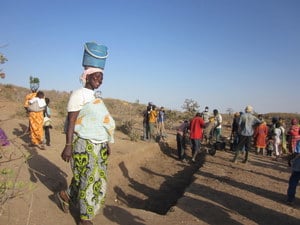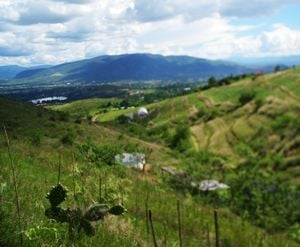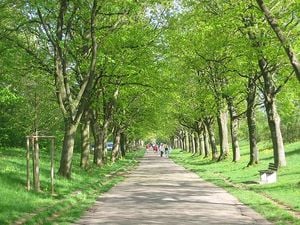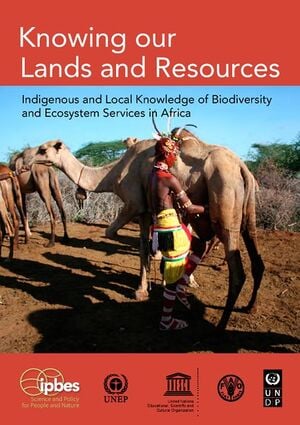This page is the beginnings of a portal for community action in response to Ecological emergency. The majority of our information about this is collated via our place pages ...Near you.

Restoration must involve all stakeholders including individuals, businesses, associations, and governments. Crucially, it must respect the needs and rights of Indigenous Peoples and local communities, and incorporate their knowledge, experience and capacities to ensure restoration plans are implemented and sustained.[1]
Ecological restoration, or ecosystem restoration, is the process of assisting the recovery of an ecosystem that has been degraded, damaged, or destroyed. It is distinct from conservation in that it attempts to retroactively repair already damaged ecosystems rather than take preventative measures. Ecological restoration can reverse biodiversity loss, combat climate change, and support local economies. Habitat restoration involves the deliberate rehabilitation of a specific area to reestablish a functional ecosystem. To achieve successful habitat restoration, it's essential to understand the life cycles and interactions of species, as well as the essential elements such as food, water, nutrients, space, and shelter needed to support species populations. When it's not feasible to restore habitats to their original size or state, designated areas known as wildlife corridors can be established. These corridors connect different habitats and open spaces, facilitating the survival of species within human-dominated landscapes. For instance, marshes serve as critical stopover sites for migratory birds, wildlife overpasses enable animals to safely cross over highways, and protected riparian zones within urban settings provide necessary refuges for flora and fauna. The United Nations named 2021-2030 the Decade on Ecosystem Restoration.
Topic and news articles[edit | edit source]
- Community action on biodiversity - Biodiversity news
- Rewilding
- Environment quality activism - Environment quality news
- Open spaces activism
- Trees, woodland and forest - Trees, woodland and forest news
- Wetlands
- Coastal community activism
- Rural sustainability
News sources[edit | edit source]
Community action projects[edit | edit source]
Ecosystem restoration[edit | edit source]

 Recognition from UN for Nepal’s tiger range restoration opens doors for technical and financial support, news.mongabay.com (Feb 15, 2024)
Recognition from UN for Nepal’s tiger range restoration opens doors for technical and financial support, news.mongabay.com (Feb 15, 2024)  Low-carbon milk to AI irrigation: tech startups powering Latin America’s green revolution, theguardian.com (Jan 30, 2024)
Low-carbon milk to AI irrigation: tech startups powering Latin America’s green revolution, theguardian.com (Jan 30, 2024)  Opportunities from a community-led strategy to save Brazil’s dry forests from desertification, news.mongabay.com (Dec 11, 2023)
Opportunities from a community-led strategy to save Brazil’s dry forests from desertification, news.mongabay.com (Dec 11, 2023)
Ecosystem restoration is the process of halting and overturning degradation, resulting in cleaner air and water, extreme weather mitigation, better human health, and recovered biodiversity, including improved pollination of plants. Restoration encompasses a wide continuum of practices, from reforestation to re-wetting peatlands and coral rehabilitation.[2]
Citizen Science[edit | edit source]

Citizen science refers to the involvement, participation and engagement of citizens in local or online (global) scientific work relevant to the citizens' interests, usually as a hobby, often as a passion.
Citizen science can include such activities as:
- Reviewing photographs or data online and spotting patterns, anomalies, things of interest etc.
- Taking field samples in local areas such as water from creeks/rivers, monitoring air quality
- Taking not of and listing species spotted, to help scientists assess decline or increase in species in certain areas; for example, see Big Garden Birdwatch as one example of such an activity
- Going through old scientific records and finding relevant data from the past and/or digitizing data for future use
- Taking measurements, keeping specific records, noting changes, etc. related to the local environment
- Sharing scientific information with other citizens in layperson's terms to spread understanding and engagement
Events[edit | edit source]
 Jun 22, 2023 (Thu) — World Rainforest Day, worldrainforestday.org
Jun 22, 2023 (Thu) — World Rainforest Day, worldrainforestday.org
 Mar 01, 2024 (Fri) — World Seagrass Day
Mar 01, 2024 (Fri) — World Seagrass Day Jun 05, 2024 (Wed) — World Environment Day
Jun 05, 2024 (Wed) — World Environment Day
Urban rural connections[edit | edit source]
section needed
Traditional ecological knowledge and restoration ecology[edit | edit source]
Traditional ecological knowledge (TEK) from Indigenous Peoples demonstrates how restoration ecology is a historical field, lived out by humans for thousands of years. Indigenous people have acquired ecological knowledge through observation, experience, and management of the natural resources and the environment around them. In the past, they managed their environment and changed the structure of the vegetation to not only meet their basic needs (food, water, shelter, medicines) but also to improve desired characteristics and even increasing the populations and biodiversity. In that way, they achieved a close relationship with the environment and learned lessons that indigenous people keep in their culture.
This means there is much that could be learned from local people indigenous to the ecosystem being restored because of the deep connection and biocultural and linguistic diversity of place. The use of natural resources by indigenous people considers many cultural, social, and environmental aspects, since they have always had an intimate connection with the animals and plants around them over centuries since they obtained their livelihood from the environment around them.
Restoration ecologists must consider that TEK is place dependent due to intimate connection and thus when engaging Indigenous Peoples to include knowledge for restoration purposes, respect and care must be taken to avoid appropriation of the TEK. Successful ecological restoration which includes Indigenous Peoples must be led by Indigenous Peoples to ensure non-indigenous people acknowledge the unequal relationship of power.
For example, the California Indians have a rigid and complex harvesting, management and production practice, largely typical horticultural techniques and concentrated forest burning. The California Indians had a rich knowledge of ecology and natural techniques to understand burn patterns, plant material, cultivation, pruning, digging; what was edible vs. what was not. This knowledge extends into wildlife management – how abundant, where the distribution was, and how diverse the large mammal population was. While the United States has counteracted the degradation, fragmentation and loss of habitat through land set aside from all human influence, indigenous practices could inform ecosystem restoration and wildlife management.
Ecosystem services[edit | edit source]
Ecosystem services is the concept of viewing the functions of ecosystems in terms of the benefits that they provide to people. By acknowledging and understanding the impact and importance of ecosystem services in people's everyday lives, this can encourage careful use of and reliance on environmental resources, remembering that our well-being is dependent on the beneficial services that nature provides.
Natural ecosystems provide ecosystem services in the form of resources such as food, fuel, and timber; the purification of air and water; the detoxification and decomposition of wastes; the regulation of climate; the regeneration of soil fertility; and the pollination of crops. These ecosystem processes have been estimated to be worth trillions of dollars annually. W
Ecological emergency[edit | edit source]

There is consensus in the scientific community that the current environmental degradation and destruction of many of Earth's biota are taking place on a "catastrophically short timescale". Scientists estimate that the current species extinction rate, or the rate of the Holocene extinction, is 1,000 to 10,000 times higher than the normal, background rate. Habitat loss is the leading cause of both species extinctions and ecosystem service decline. Two methods have been identified to slow the rate of species extinction and ecosystem service decline, they are the conservation of currently viable habitat and the restoration of degraded habitat. The commercial applications of ecological restoration have increased exponentially in recent years. In 2019, the United Nations General Assembly declared 2021–2030 the UN Decade on Ecosystem Restoration. W
UN Decade on Ecosystem Restoration[edit | edit source]

 Green Deal: pioneering proposals to restore Europe's nature by 2050 and halve pesticide use by 2030, ec.europa.eu (Jun 22, 2022)
Green Deal: pioneering proposals to restore Europe's nature by 2050 and halve pesticide use by 2030, ec.europa.eu (Jun 22, 2022)
The UN Decade on Ecosystem Restoration 2021-2030 is a rallying call for the protection and revival of ecosystems all around the world, for the benefit of people and nature. It aims to halt the degradation of ecosystems and restore them to achieve global goals. The United Nations General Assembly has proclaimed the UN Decade and it is led by the United Nations Environment Programme and the Food and Agriculture Organization of the United Nations. The UN Decade is building a strong, broad-based global movement to ramp up restoration and put the world on track for a sustainable future. That will include building political momentum for restoration as well as thousands of initiatives on the ground.[3]
The decade was conceived as a means of highlighting the need for greatly increased global cooperation to restore degraded and destroyed ecosystems, contributing to efforts to combat climate change and safeguard biodiversity, food security, and water supply. W
Near you[edit | edit source]
External links
References
